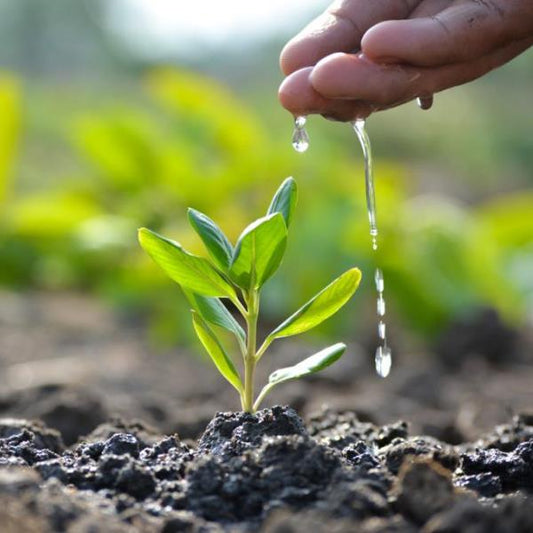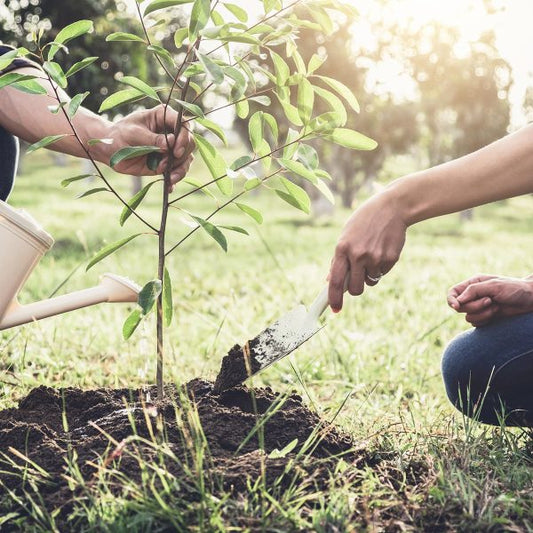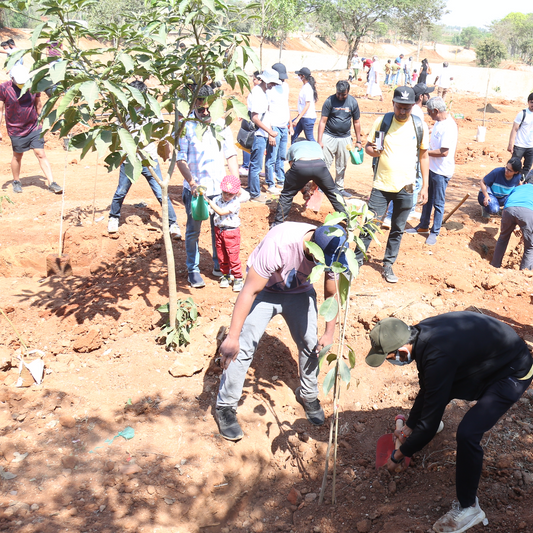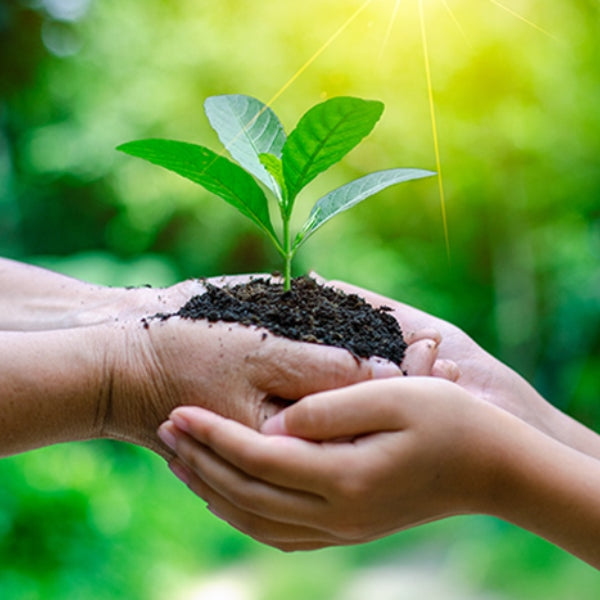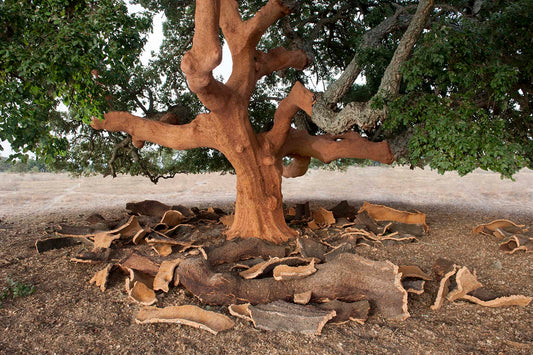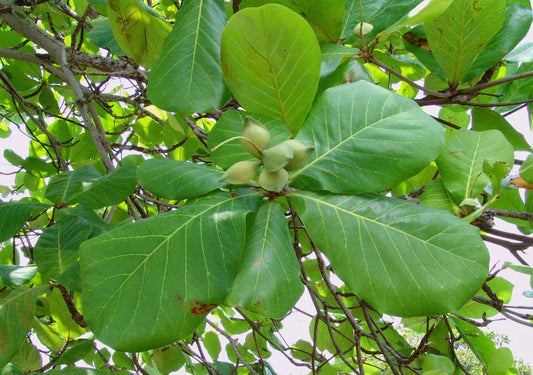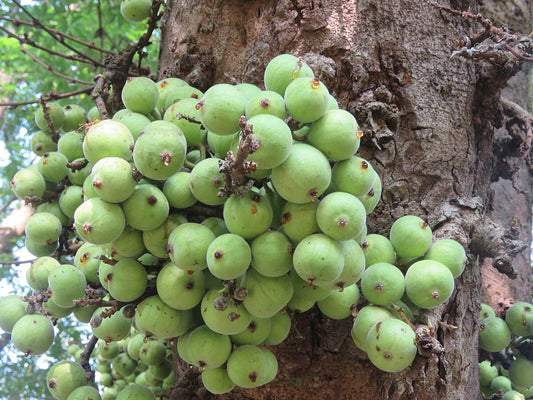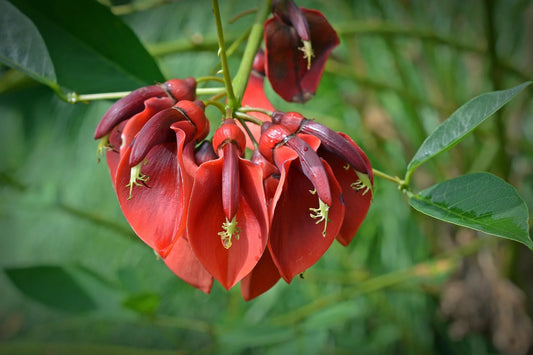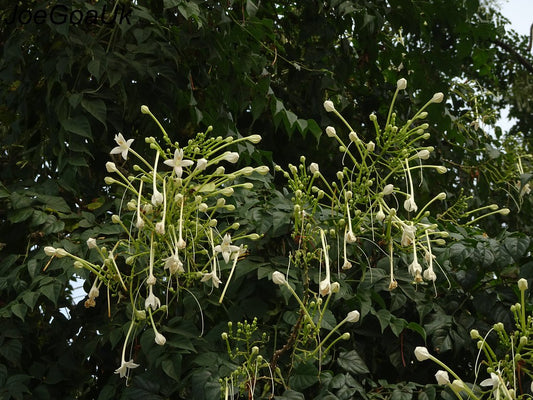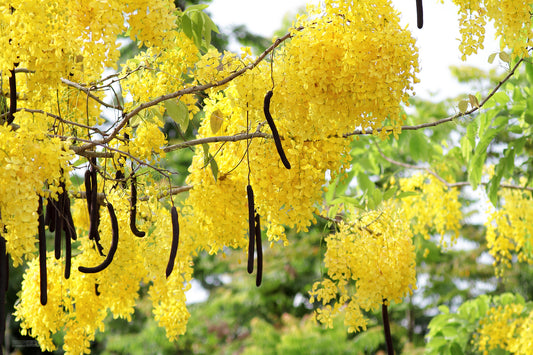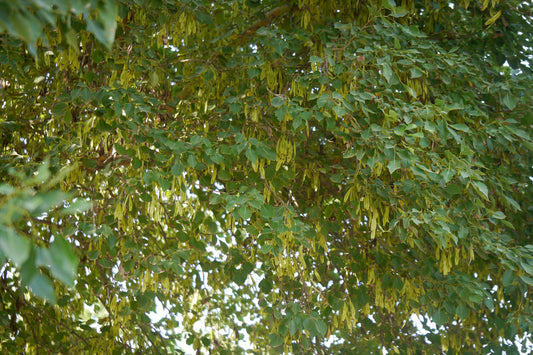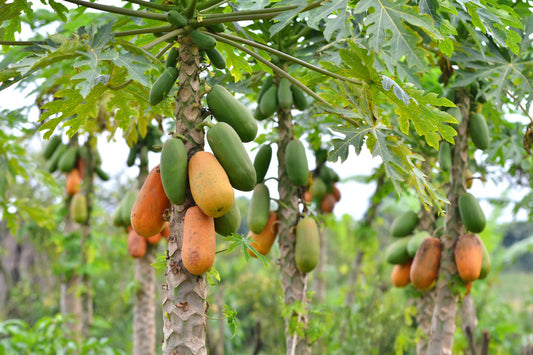

Did you know that the Karwand, also known as Carissa carandas, has been revered in Ayurveda for centuries due to its medicinal properties? Taxonomy and Botanical Features: Karwand, scientifically known as Carissa carandas, belongs to the Apocynaceae family. It's a spiny, evergreen shrub native to th Read more
Trending
Trees for Corporates
Carissa carandas (Karwand)
Did you know that the Karwand, also known as Carissa carandas, has been revered in Ayurveda for centuries due to its medicinal properties?
Taxonomy and Botanical Features: Karwand, scientifically known as Carissa carandas, belongs to the Apocynaceae family. It's a spiny, evergreen shrub native to the Indian subcontinent, particularly prevalent in tropical and subtropical regions.
The plant typically grows up to 2-3 meters in height and bears small, oval-shaped leaves with sharp thorns. Karwand produces white, star-shaped flowers that emit a sweet fragrance, followed by round, fleshy fruits that ripen to a dark purple or black color.
Historical and Cultural Significance: Karwand holds significant historical and cultural importance across various civilizations. In India, it has been mentioned in ancient texts like Ayurveda and the Charaka Samhita for its medicinal properties.
Moreover, Karwand holds religious significance in Hinduism, often associated with deities like Lord Shiva and Goddess Parvati. In some regions, Karwand fruits are offered in religious rituals and ceremonies as a symbol of auspiciousness and prosperity.
Medicinal Properties and Traditional Uses: Karwand boasts a plethora of medicinal properties, making it a prized herb in traditional medicine systems. It is revered for its anti-inflammatory, anti-microbial, and antioxidant properties. In Ayurveda, Karwand is used to treat various ailments, including digestive disorders, respiratory infections, and skin diseases.
Its fruits are rich in vitamins, minerals, and phytochemicals, contributing to overall health and well-being. Additionally, Karwand is believed to have aphrodisiac properties and is used to enhance libido and fertility.
Agricultural Applications: Karwand has significant agricultural applications, both as a commercial crop and for agroforestry purposes. The plant is valued for its hardy nature and tolerance to drought and poor soil conditions.
Karwand cultivation is relatively low-maintenance, requiring minimal water and inputs. The fruits, although small, are high in demand for their medicinal and culinary uses, making Karwand cultivation a lucrative venture for farmers.
Modern Scientific Research: Modern scientific research has delved into the medicinal properties of Karwand, validating its traditional uses. Studies have shown that Karwand extracts exhibit potent antioxidant and anti-inflammatory effects, offering potential therapeutic benefits against chronic diseases like diabetes, cancer, and cardiovascular disorders.
Furthermore, Karwand has demonstrated antimicrobial activity against various pathogens, highlighting its role in combating infectious diseases. Ongoing research continues to explore Karwand's pharmacological properties and potential applications in modern medicine.
Environmental Impact and Sustainability: Karwand cultivation promotes environmental sustainability due to its ability to thrive in marginal lands and degraded soils. Its deep root system helps prevent soil erosion and improves soil fertility, making it suitable for agroforestry and land rehabilitation projects.
Additionally, Karwand forests provide habitat for diverse flora and fauna, contributing to biodiversity conservation. Furthermore, Karwand's low water requirement and minimal chemical inputs make it an eco-friendly crop, reducing environmental pollution and promoting sustainable agriculture practices.
Economic Importance: Karwand holds significant economic importance for rural communities, particularly in regions where it is cultivated commercially. The fruits are harvested and sold in local markets or processed into value-added products like jams, juices, and dietary supplements, generating income for farmers and entrepreneurs.
Moreover, Karwand cultivation creates employment opportunities along the value chain, including harvesting, processing, packaging, and marketing. Its high demand in traditional medicine and herbal industries further enhances its economic value.
Conservation Status and Future Prospects: While Karwand is not listed as a threatened species, its wild populations face habitat loss and overexploitation due to deforestation and unsustainable harvesting practices. Efforts are underway to promote sustainable cultivation practices and conservation initiatives to safeguard Karwand populations and their habitats.
Furthermore, research into Karwand's genetic diversity and breeding programs aims to develop improved cultivars with enhanced yield and medicinal properties. With proper conservation measures and investment in research and development, Karwand holds promising prospects for sustainable agriculture and herbal medicine industries.
Conclusion: In conclusion, Karwand, with its rich history, diverse medicinal properties, and ecological significance, emerges as a remarkable botanical treasure. From ancient Ayurvedic texts to modern scientific research, its virtues continue to be celebrated and explored.
As we navigate towards a future of sustainability and well-being, Karwand stands as a symbol of resilience, offering solutions for human health, environmental conservation, and economic prosperity. Embracing the legacy of Karwand, we pave the way for a greener, healthier tomorrow.
References:
- Wikipedia: Carissa carandas - https://en.wikipedia.org/wiki/Carissa_carandas
- Indian Council of Agricultural Research (ICAR): http://www.icar.org.in
- National Horticulture Board (NHB): http://www.nhb.gov.in
- ResearchGate: http://www.researchgate.net
You may also like
Corporate Plantations
Carissa carandas Overview
Explore the characteristics and significance of Carissa carandas, a species of flowering shrub native to the Indian subcontinent. Learn about its botanical features, cultural uses, and ecological importance.
Botanical Profile of Carissa carandas
Delve into the botanical details of Carissa carandas, including its leaves, flowers, fruits, and growth habits. Understand the taxonomy and morphology of this versatile shrub, which belongs to the Apocynaceae family.
Distribution of Carissa carandas
Learn about the natural distribution of Carissa carandas across South Asia, including India, Pakistan, Bangladesh, and Sri Lanka. Explore its adaptation to diverse climates and habitats, from tropical forests to arid regions.
Ecological Role of Carissa carandas
Discover the ecological significance of Carissa carandas in supporting biodiversity and ecosystem functions. Explore its role as a food source for wildlife, a habitat for pollinators, and a contributor to soil health and nutrient cycling.
Cultural Importance of Carissa carandas
Explore the cultural significance of Carissa carandas in traditional cuisines, medicinal practices, and rituals. Learn about its use in regional dishes, herbal remedies, and religious ceremonies across South Asia.
Medicinal Properties of Carissa carandas
Delve into the medicinal properties attributed to Carissa carandas in Ayurveda, Siddha, and traditional medicine systems. Discover its therapeutic uses for treating digestive disorders, skin conditions, and respiratory ailments.
Culinary Uses of Carissa carandas
Learn about the culinary uses of Carissa carandas fruits in South Asian cuisines. Explore traditional recipes for pickles, chutneys, jams, and beverages made from Karonda, prized for its tangy flavor and nutritional value.
Nutritional Value of Carissa carandas
Explore the nutritional composition of Carissa carandas fruits, which are rich in vitamin C, antioxidants, and dietary fiber. Discover their health benefits for boosting immunity, improving digestion, and promoting overall well-being.
Traditional Harvesting and Processing
Gain insights into traditional harvesting and processing methods for Carissa carandas fruits. Learn about seasonal harvesting practices, post-harvest handling techniques, and value-added processing for culinary and medicinal purposes.
Agroforestry and Farming Practices
Explore the role of Carissa carandas in agroforestry systems and small-scale farming operations. Discover its potential for diversifying income streams, enhancing soil fertility, and providing supplemental nutrition for rural households.
Cultivation Techniques and Varieties
Learn about cultivation techniques and improved varieties of Carissa carandas for commercial production. Explore agronomic practices, irrigation methods, and pest management strategies for maximizing yield and quality.
Value-Added Products and Industries
Discover value-added products and industries associated with Carissa carandas cultivation. Explore opportunities for agribusiness, food processing, and herbal medicine manufacturing using Karonda fruits and derivatives.
Market Trends and Economic Opportunities
Gain insights into market trends and economic opportunities in the Carissa carandas industry. Explore domestic and international markets for fresh fruits, processed products, and botanical extracts, driving demand and investment in Karonda cultivation.
Sustainable Management Practices
Learn about sustainable management practices for Carissa carandas orchards and wild populations. Explore approaches for biodiversity conservation, water resource management, and community engagement in Karonda cultivation.
Research and Innovation
Discover research initiatives and technological innovations aimed at enhancing Carissa carandas cultivation, productivity, and value chain development. Explore collaborations between academia, industry, and government agencies to advance Karonda research and innovation.
Climate Resilience and Adaptation
Explore the climate resilience and adaptation strategies of Carissa carandas in response to changing environmental conditions. Learn about its tolerance to drought, heat, and soil salinity, contributing to agricultural resilience in marginal areas.
Biodiversity Conservation
Understand the role of Carissa carandas in promoting biodiversity conservation and habitat restoration efforts. Explore its potential for reforestation, agroecology, and landscape restoration in degraded ecosystems.
Community Empowerment and Livelihoods
Learn about community empowerment and livelihood opportunities associated with Carissa carandas cultivation and value addition. Explore initiatives for women's economic empowerment, rural entrepreneurship, and inclusive value chains.
Policy Support and Regulatory Frameworks
Gain insights into policy support and regulatory frameworks for Carissa carandas cultivation and trade. Explore government initiatives, certification programs, and quality standards promoting sustainable practices and market access.
Future Prospects and Challenges
Delve into the future prospects and challenges facing Carissa carandas cultivation and industry development. Explore opportunities for innovation, diversification, and market expansion, as well as risks related to climate change, pests, and market volatility.
FAQ
What is Karwand?
Karwand, scientifically known as Carissa carandas, is a small fruit-bearing shrub native to the Indian subcontinent. It belongs to the Apocynaceae family and is commonly found in tropical and subtropical regions.
What are the health benefits of Karwand?
Karwand is renowned for its numerous health benefits. Rich in antioxidants, vitamins, and minerals, it aids in boosting immunity, improving digestion, and promoting skin health. Regular consumption of Karwand can also help in managing cholesterol levels and supporting heart health.
How is Karwand cultivated?
Karwand cultivation requires well-drained soil and adequate sunlight. It can tolerate drought conditions but thrives in moderately moist environments. Propagation is usually done through seeds or stem cuttings, and regular pruning helps maintain plant health and fruit production.
What are the culinary uses of Karwand?
Karwand fruits are used in various culinary preparations, including jams, jellies, chutneys, and beverages. They impart a tangy flavor and are often combined with sugar or spices to enhance their taste.
Is Karwand suitable for agroforestry?
Yes, Karwand is well-suited for agroforestry practices. Its deep root system helps prevent soil erosion, making it ideal for slope stabilization. Additionally, its fruits provide an additional source of income for farmers.
Are there any medicinal properties associated with Karwand?
Yes, Karwand is known for its medicinal properties in traditional medicine systems like Ayurveda. It is believed to have anti-inflammatory, anti-diabetic, and anti-cancer properties, among others.
What are the environmental benefits of planting Karwand trees?
Planting Karwand trees helps in biodiversity conservation, soil erosion control, and carbon sequestration. They also attract pollinators and support the ecosystem's overall health.
Can Karwand be grown in containers or pots?
Yes, Karwand can be grown in containers or pots, provided they have sufficient drainage and receive adequate sunlight. Regular watering and fertilization are essential for optimal growth.
How long does it take for Karwand plants to bear fruits?
Karwand plants typically start bearing fruits within 2-3 years of planting. However, the exact time may vary depending on growing conditions and cultivar.
What pests and diseases affect Karwand plants?
Karwand plants are relatively resistant to pests and diseases. However, they may be susceptible to aphids, mealybugs, and fungal infections in humid conditions. Proper sanitation and timely treatment can help manage these issues.
Is Karwand considered an invasive species?
No, Karwand is not considered an invasive species. It is a native plant in many regions and plays a vital role in supporting local ecosystems.
What is the best time to prune Karwand plants?
The best time to prune Karwand plants is during the dormant season, typically in late winter or early spring. This helps promote new growth and improves fruit production.
Most Popular
Connect with us
-
👥 Corporates
If you are looking for:
- 🌲 Tree Plantation Events
- 📊 CSR Projects
📧 corporate@growbilliontrees.com
📞 +91 9699723523
💬 WhatsApp (Only): +91 9370599291
🕒 Mon - Sat | 10am - 7pm IST
-
🧩 Tree Plantation NGOs
If you are looking for:
- 💰 Financial Assistance
- 🤝 Operational Support
📧 support@growbilliontrees.com
📞 +91 9699723523
💬 WhatsApp (Only): +91 9370599291
🕒 Mon - Sat | 10am - 7pm IST
-
🌼 Individuals
If you are looking for:
- 👥 Group Tree Plantation Drive
- 🌳 Bulk Tree Plantation
📞 +91 9699723523
💬 WhatsApp (Only): +91 9370599291
🕒 Mon - Sat | 10am - 7pm IST



